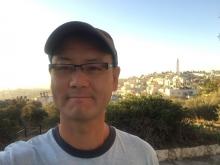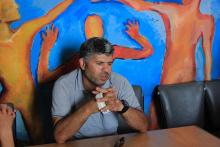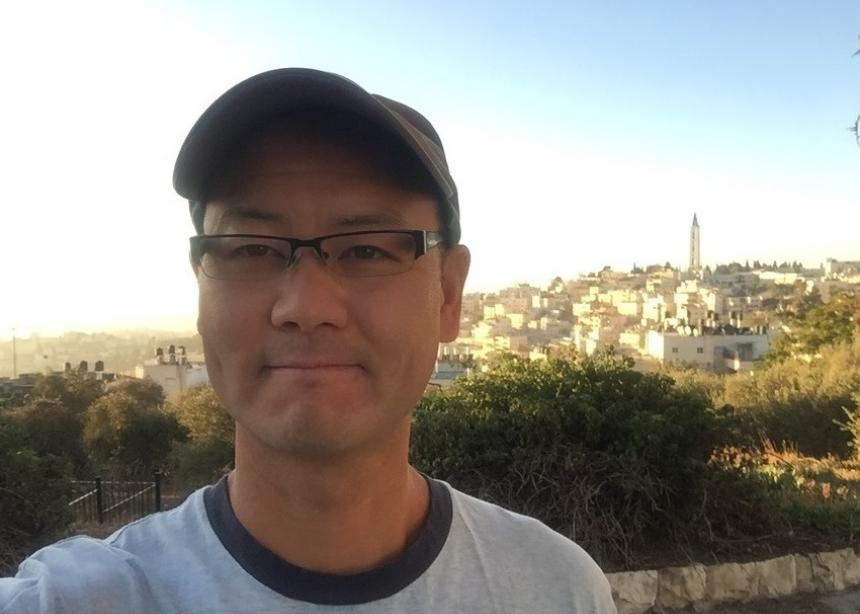David Chow recalls sitting in Sunday school as a child and learning about what the nation of Israel meant for Christians in a traditional Christian Missionary Alliance congregation in Calgary, Alberta.
Chow grew up believing that the current state of Israel is a continuation of the biblical people of Israel, and that building up the state of Israel is a sign that Jesus is returning.
“We were taught that the reconstitution of the nation of Israel is a miracle … that the nation of Israel was one of the big signs Jesus is coming back,” he explains.
At the time, Chow didn’t question his church’s stance that Palestinians were getting in the way of the miracle of the reconstitution of Israel. Compounded with the news media’s interpretation of the long-standing conflict in Palestine and Israel, Chow had a rather limited view of Palestinians, he admits.
“I grew up with the narrative that Palestinians are Arabs, Arabs are Muslims and Muslims are violent people,” he says. “We were taught to support the children of Israel and taught to believe in who the people of God are and that God is at work through these people.”
As he grew up, learned more about the situation, attended seminary and began working as a pastor at Killarney Park Mennonite Brethren Church in Vancouver, British Columbia, his view gradually became more nuanced, but it wasn’t until Chow took part in a Mennonite Central Committee (MCC) learning tour to Palestine’s West Bank that he began to see the harm caused by the stereotypes he internalized.
“There’s a cost to that. The reconstitution of Israel means a lot of things on the ground. It means soldiers, guns, people being forcibly evicted, mandatory military service and young kids being indoctrinated. That was eye opening,” he explains.
Chow visited the West Bank with other members of MCC’s board in September and October of 2016 to see some of the projects MCC supports and to meet with Palestinian Christians and Muslims MCC works with.
Abe Bergen of Kleefeld, Manitoba, a moderator for the Evangelical Mennonite Conference and land developer, didn’t really take time to think of the conflict, but he knew he didn’t want to visit the region.
“My perception was largely that, why would I go to the Middle East, endanger myself and come back in a body bag? That was my gut response to Israel and Palestine,” Bergen said.
Bergen had been asked to take part in learning tours for several years. At first, he declined the invitation, and then in the subsequent year the tours were cancelled. Finally, after being invited a second time, Bergen decided to go.
The learning tour drastically changed what he thought he knew about the region. For instance, Bergen’s perspective, largely informed by watching mainstream media portrayals of the Middle East, was of Israel actively building peace with Palestinians. But he soon discovered how incomplete that picture was.
“They [Israel] are projected as a liberal democracy, a sign of hope in a very hostile place,” he says.
But Bergen was confronted with a different reality on the ground.
One day the group visited the Aida refugee camp, one of 19 camps in the West Bank. There, Bergen came across a poster bearing the image of Aboud Shadi, a 13-year-old Palestinian boy who was killed by an Israeli sniper while he was playing with his friends.
“That kind of injustice is just so real and overwhelming,” Bergen said through tears. “There is no theology, there are no politics that justify the killing of a 13-year-old boy.”
Chow was overwhelmed by the faith he saw in Palestinian Christians, including Daoud Nassar, a farmer living in the West Bank who is committed to nonviolence. The Nassar family has seen their orchards bulldozed or uprooted by Israeli soldiers, they face checkpoints daily and often worry about losing the land that’s been in their family for generations.
“To see one family come up against a whole military and government apparatus that was designed to win in courts and legal circles, and yet he’s doing this protest with nonviolence,” Chow says. “He is determined to not hate and determined to be a voice of compassion and, frankly, the good news of Jesus Christ. It inspired me.”
The biggest lesson Bergen and Chow learned is that the region is much more complicated than they were led to believe, both theologically and politically.
“Things are so abstract,” Bergen says. “They’re just pictures on the screen and stories in our mind. There are narratives at play we’re not aware of until we encounter them. You can’t do that unless you take steps to seriously address that. A learning tour did that for me.”
The tour prompted Chow to rethink what the kingdom of God looks like.
“Does it look like 18-year-old Israeli soldiers carrying M-16s marching around, sometimes in fear? Is that the kingdom of God? Is the kingdom of God people who, despite the odds, are showing love and are determined to forgive and live selflessly without regard to personal safety and yet declare Jesus as Lord? That was transformational,” he says.
To learn more about MCC’s work in Palestine and Israel, check out the A Cry For Home campaign https://mcccanada.ca/learn/where/middle-east/palestine-israel/cry-for-ho...

MCC Canada board member David Chow grew up believing that the current state of Israel is a continuation of the biblical people of Israel, and that building up the state of Israel is a sign that Jesus is returning. Chow visited the West Bank with other members of MCC’s board in September and October of 2016. The learning tour shifted his perspective on the region and what the kingdom of God looks like. (MCC photo)

Daoud Nassar is a farmer living in the West Bank who is committed to nonviolence. Nassar lives at the Tent of Nations, a farm and educational centre near Bethlehem, where his family has lived for more than 100 years. The farm is surrounded by five Israeli settlements collectively called Gush Etzion. In 1991, the Israeli government declared the Nassar’s farm to be state land, and there were plans to expand the settlements onto the Nassars’ property. The family hired a lawyer and took the case to court. It is still unresolved. The family opened the Tent of Nations on their land in 2000, hosting international guests to work on their farm and to learn more about their life in Palestine. (MCC photo)



Add new comment
Canadian Mennonite invites comments and encourages constructive discussion about our content. Actual full names (first and last) are required. Comments are moderated and may be edited. They will not appear online until approved and will be posted during business hours. Some comments may be reproduced in print.